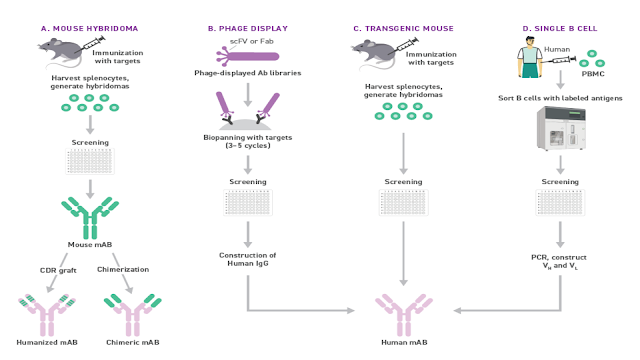What is Somatic Hypermutation? / Cos'è l'ipermutazione somatica?
What is Somatic Hypermutation? / Cos'è l'ipermutazione somatica?
Segnalato dal Dott. Giuseppe Cotellessa / Reported by Dr. Giuseppe Cotellessa
Somatic hypermutation is a process by which mutations are introduced into CDRs to expand or enhance the ability of antibody-producing B-cells to bind to specific antigens.
Fully Human mAbs Straight From the Source:
Single Human B Cells
One promising and potentially rapid method for developing fully human mAb therapeutics, especially for emerging pathogens, is isolating and sorting single B cells from humans that have been infected with a bacterial, viral, or eukaryotic pathogen. Individual antigen-positive B cells can be sorted by their ability to bind to labeled antigens. Positive binders are then sequenced, and heavy and light chain genes can be cloned for downstream optimization.
This method is incredibly exciting and many research groups have reported the successful isolation of mAbs that target a number of pathogens.1 Human mAbs that target Ebolavirus, HIV-1, influenza, and respiratory syncytial virus are all being evaluated clinically, however, no FDA-approved therapeutics have made it to market yet.
While exciting, this methodology can be challenging in practice: Without specialized instrumentation, isolating single cells and rapidly assaying for specific binding can be imperfect and labor intensive. Thus, FACS, lasercapture microdissection, micromanipulator, and microfluidic techniques and instrumentation have been developed to assist research groups taking this approach.
ITALIANO
L'ipermutazione somatica è un processo mediante il quale le mutazioni vengono introdotte nelle CDR per espandere o migliorare la capacità delle cellule B che producono anticorpi di legarsi ad antigeni specifici.
MAbs completamente umani direttamente dalla sorgente:
Cellule B umane singole
Un metodo promettente e potenzialmente rapido per lo sviluppo di terapie mAb completamente umane, in particolare per i patogeni emergenti, consiste nell'isolare e selezionare singole cellule B da esseri umani che sono stati infettati da un patogeno batterico, virale o eucariotico. Le singole cellule B antigene-positive possono essere selezionate in base alla loro capacità di legarsi agli antigeni marcati. I leganti positivi vengono quindi sequenziati ed i geni delle catene pesanti e leggere possono essere clonati per l'ottimizzazione a valle.
Questo metodo è incredibilmente eccitante e molti gruppi di ricerca hanno riportato il successo dell'isolamento di mAb che prendono di mira un certo numero di agenti patogeni. Gli mAb umani che colpiscono Ebolavirus, HIV-1, influenza e virus respiratorio sinciziale sono tutti valutati clinicamente, tuttavia, nessuna FDA - le terapie approvate non sono ancora arrivate sul mercato.
Sebbene entusiasmante, questa metodologia può essere impegnativa nella pratica: senza strumentazione specializzata, isolare singole cellule e analizzare rapidamente il legame specifico può essere imperfetto e laborioso. Pertanto, sono state sviluppate tecniche e strumentazione FACS, microdissezione di cattura laser, micromanipolatore e microfluidica per assistere i gruppi di ricerca che adottano questo approccio.
Da.
https://f.hubspotusercontent40.net/hubfs/547446/Technology%20Networks/Landing%20Pages/Twist%20Bio/May%202021/eBook_Biopharma_AntbodyDiscoveryandDev_02APRIL21_Rev1.0_0.pdf?__hstc=8807082.44b0f6eac84be5818378483b36bfad3b.1601170002551.1621382061009.1622335921752.112&__hssc=8807082.2.1622335921752&__hsfp=2281083568&hsCtaTracking=ab6385e9-0a38-4af4-8bcb-bcc4108a5a59%7C5e7e8d79-eaee-44f7-a75d-3d5a2a4f479e




Commenti
Posta un commento